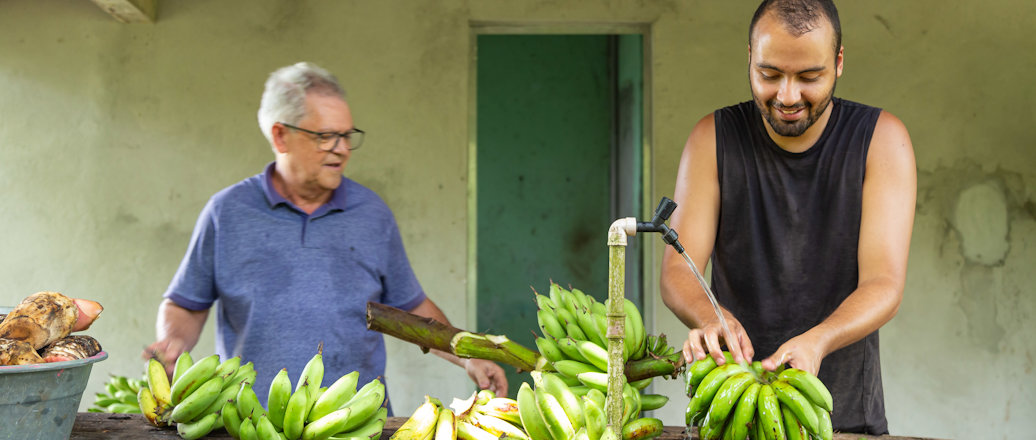Banana is versatile, rich in potassium, vitamins and fiber, and is considered the most consumed fruit in Brazil, reaching around 25 kilos per capita/year. Therefore, banana production is a very important activity in Brazilian agribusiness. According to the IBGE, in 2020, 6.7 million tons were produced in the country, in an area of more than 456 thousand hectares.
In terms of the economy, according to the Ministry of Agriculture, the sector earns around BRL 13.8 billion/year. Even with a low percentage exported in 2020, revenue from the foreign trade of the product totaled US$ 18 million, according to the Secretariat of Foreign Trade (Secex). After the orange, it is the most important fruit in terms of area harvested, quantity produced, value of production and consumption in Brazil. The states of São Paulo, Bahia, Pará, Santa Catarina, Minas Gerais, Pernambuco and Ceará are the most representative, both in harvested area and in banana production in Brazil, with more than 95% of production destined for the domestic market. In Pará, the main producers are the municipalities of Novo Repartimento, Medicilândia and Altamira. Much of the production is marketed within the state, which has the largest consumer market in the capital.
Despite the expansion of large commercial crops, banana is produced mainly by small and medium producers, with intensive use of family labor. And this family production, developed in Barcarena, is the support base of the Tipitix Project - Community Agro-Food Entrepreneurship, developed by the Hydro Sustainability Fund in partnership with the Mitsui Bussan Foundation of Brazil and the Peabiru Institute.
Elias Bezerra has been cultivating bananas for about five years on a farm in the urban area of Barcarena. Along with him, three other family members work directly in the production. Currently, he cultivates 10 varieties of the fruit, of the approximately 1000 existing varieties, between wild and cultivated species. The species cultivated by the farmer are plantain, apple-princess, silver, sao tomé, roxa, nanica, cocoa, pacovan, inajá and missouri. Of these, the best known in Pará are silver, nanica and terra. “I sell these more well-known types in grocery stores and in some neighborhoods of the city, the other, more exotic types, I sell to order, as they have a smaller production and are difficult to find”, explains Elias.
With the project's support, he turned bananas into baked chips and success was immediate. “My focus was to transform the banana into a more durable product, with a good sales expectation for the product. With the great acceptance, I am already expanding the area for planting the fruit and I have acquired another land to meet the demand that has grown even in large supermarkets in the capital, with the help of Tipitix”, says the farmer, enthusiastically.
About Tipitix
Created in 2021, Tipitix serves about 200 family farmers, producers of cassava and its derivatives, as well as fruits, vegetables and various other products from more than 20 rural communities in Barcarena (PA). The Tipitix project offers technical assistance for the development of products, infrastructure for the improvement of production; in addition to support in design, credit and commercial advice for the insertion of products in the market. The project also offers administrative and accounting support for the procedures related to the formalization and management of the participating enterprises.
This July, the project launched the call for its third Business Development Cycle, which will offer a set of services and solutions for 10 individual or group entrepreneurs. Support offers technical advice; infrastructure for processing production; support in design, credit and commercial advice; administrative and accounting support. Applications can be made until August 1 at https://www.tipitix.com.br/.
In addition, the project, to develop cycles 1 and 2, received a total investment of BRL 1.5 million. In June of this year, the Tipitix contract was extended for another 12 months and will have continuity guaranteed by the renewal with the Hydro Sustainability Fund and the Mitsui Foundation. The total investment for this new stage will be BRL1,375,040.00.
About the Hydro Sustainability Fund - The Fund was created by Hydro, Alunorte and Albras to manage the financial investment, based on the guidelines and priorities defined within the scope of the Sustainable Barcarena Initiative (IBS, in portuguese). The Fund is the result of the investment commitment of BRL 100 million, over a period of ten years, assumed by the companies in April 2018.
Banana facts:
- When bananas are ripe, the starch turns into sugar, so they are sweeter when they are ripe;
- There is a banana museum, located in California (USA), with different products, being the largest collection in the world dedicated to a fruit (http://www.internationalbananamuseum.com/);
- Two bananas contain enough energy for intense physical exercise;
- Brazil is the fourth largest banana producer in the world, after India, China and Indonesia;
- Each banana plant produces 5 to 15 hands at once and each ripe fruit has 75% water and 25% dry matter in its composition;
- Did you know that the banana has a twin? Called plantain, it has a hard, greenish skin, large size, hard pulp and not so sweet flavor, serving more as a vegetable than a fruit itself in the countries where it is most popular, Spain and Portugal. It retains its green color even when it reaches the matured form. That is, the fruit will not turn yellow, as with the banana;
- Both banana and plantain contain tryptophan in their compositions, an amino acid capable of causing a feeling of well-being and good mood in the brain, eliminating stress and fighting depression and discouragement;
- If you want to lose weight, plantains and bananas can help in this task, as they have vitamins, minerals and proteins capable of promoting weight loss;
- The inside of a banana peel can help relieve itching and inflammation, such as insect bites or poison ivy.
: July 19, 2022







